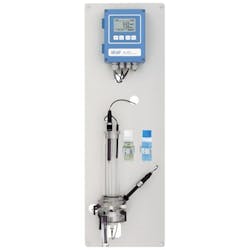Reagentless Chlorine Measurement Reduces Maintenance
Managing chlorine residuals can be one of the most challenging aspects of ensuring quality at a water treatment plant. Different techniques and analyzers provide a variety of choices to make. While traditional DPD-based colorimetric instruments provide reliable results, it can be time-consuming to replenish reagents, verify pump and valve operation and clean measuring cells. Where conditions allow, a reagentless amperometric systems can eliminate those concerns.
The amperometric method utilizes a three-electrode system that can be used to measure hypochlorous acid, free chlorine, chlorine dioxide, ozone, bromine or iodine. The sensor consists of two platinum electrodes and a reference electrode. A voltage is applied between the measuring electrode (platinum rod) and the counter electrode (platinum ring) of the sensor. The disinfectant in the sample generates a small current between the electrodes that is proportional to the disinfectant concentration. The reference electrode controls the voltage and guarantees optimal measuring conditions on the platinum sensor. It will work well in potable water in the absence of metals and scale/corrosion inhibitors.
[Click here to visit Swan Analytical's W&WD Storefront]
Swan Analytical AMI Trides analyzers provide reagentless chlorine measurements in clean water. Their self-cleaning reference and flow validation functions assure reliable results. The complete panel-mounted system makes installation easy. Their software, hardware and sensor self-checks and electronic drift stabilization ensure high confidence in the measurement accuracy. Digital and analog communication options are available.
